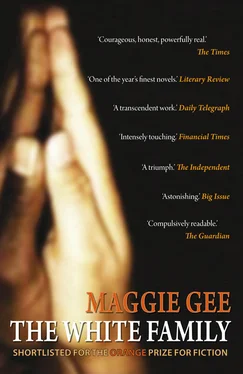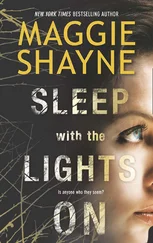If Elroy and I had a family, I often think it would all be easy.
Warm and dry in the revolving door, sweeping me into sweet-smelling heaven.
The department stores: my second home. Mum says they never shopped like us, in her day. The big stores weren’t for people like her. I think it frightens her, my shopping, even though I tell her I have plenty of money, even though it doesn’t do any harm. ‘We only shopped when we had to, dear. Too much to do, and we didn’t have the money.’I do have the money. Kojo’s money.
They make me welcome. I feel I fit in. I don’t feel lonely or sad, when I’m shopping.
Besides, a lot of shops know me, by now. The Hosiery department, in DH Evans. Ladies’ Fashion in Selfridges. I like to specialize, you see. That way, they start to take an interest. In the Perfume department in John Lewis, they know my face, they know my taste. They look at me and think Givenchy. Imagine that. A family of scents. A beautiful family, a Parisian family, worn on smooth skin all over the world, worn with lace, worn with pearls –
They look at me, and think ‘Paris, Europe,’ not Shirley White as I used to be, one of the family from Hillesden Junction, who’ve lived in Hillesden since life began. And with that thought, they set me free.
All my life till I was twenty-eight and married Kojo, I was Shirley White. Alfred and May’s unmarried daughter. The one who somehow messed up her life. In the mean streets of Hillesden they thought they knew me.
Kojo saved me. Kojo re-named me. Kojo saw what I could become.
And then he bloody went and left me. Then he died, and let me down. Then he got ill from the wretched fags, the bloody awful lethal fags, the hateful stinking sticks of poison, drawers full of cartons from the duty-free.
Then he died and abandoned me. And I was dragged back to my family.
What if Dad starts shrinking like Kojo did? Before my eyes, inch by inch. I tempted him with all his favourite dishes, palm soup with fufu , spinach and okra stew, but he ate less and less, though he wanted to please me. I begged him to eat, one steamy hot day, and he lost his temper, Kojo never lost his temper but he shouted at the wall, the window, the garden, the little garden so unlike Ghana, ‘Nothing tastes right … How can I eat it?’ Then he muttered something angry about obroni .
I think he meant he was missing Ghana, perhaps he wanted to die in Ghana. After he shouted, I began to cry. I started to clear the plates away. And he said, very quietly, himself again, ‘But I love you, my Obroni Yaa.’ It meant, ‘White Person Born on Thursday’. I went and hugged him. He was skin and bone. ‘I don’t want to leave you.’ ‘You’re not going to leave me.’ Thursday’s child has far to go … I would have followed him anywhere, but I couldn’t die, though I lay beside his body and begged Jesus to take me.
But Dad won’t die. Of course he won’t. People get better from strokes all the time. I should worry about Mum. She’ll wait on him even more than usual, hand and foot –
I don’t think I shall be able to help her. I’ll do my best, but I don’t think I can bear it. I don’t want to look after his body, however old it’s become, and weak.
Because when he was strong, he frightened us.
The boys worse than me, but he hit me too. When I was too little to protect myself. I took it for granted for years and years, and then I realized he had no right. That I had a right to mind, to be angry. And I was angry. I am angry . More for the fear, I think, than the bruises. No bruises to speak of. Only the fear.
I like the café I’m going to. One of the nicest of the big store cafés. I look good in the mirrors: blond, confident, surging upwards on the escalator. Past Children’s Clothes, which I never look at, searching for the pale pink sign for heaven: Café Claire . Waitress Service.
I like to sit where I can see the view. Right across the roofs of London. I once tried counting all the windows you could see. Windows where people might be sitting and dreaming or getting better from illnesses. Windows where lovers might lie in bed. I stopped when I got near two hundred.
I don’t want to think. Turn up the Muzak. Well-dressed women, mostly older than me, blond-streaked helmets, their heads held high. They have had husbands, sorrows, triumphs, they lift their chins, they put on a good show. (And children. Most of them must have had children.)
Mum had three children. I have none.
May butted on down the dark road in the rain. Every part of her felt uncomfortable. The fingers of her gloves were cold and soggy. There seemed to be nobody around to chat to, though there would be a queue in the post office.
She liked the postmaster, Mr Varsani, a meticulous man who had come to England after the war and brought up his family in Hillesden Rise. They were the first in their street to modernize their house, the first with an extension, the first to concrete over the little front garden. They kept the plane-tree, which others had not. Two cars shone side by side on the concrete, cleaned and polished every weekend. He chatted to May when the counter wasn’t busy. She liked his smooth tan skin, his sharp intelligence, though Alfred picked it up and got jealous and accused him of cheating with the change. ‘See what they’re like. You can’t trust them.’ That was her husband. Men did get jealous.
Now May was depending on Nimit Varsani to sort out her problem with the pension book. Thank heavens for the post office, she thought. Where would the old people be without that? She herself wasn’t old, but there were so many people who could hardly walk, and wouldn’t make it to Kilburn. And the young mothers, trailing crowds of kids. They didn’t all have cars. They didn’t all have husbands. The post office was the heart of Hillesden Rise.
The young ones seemed to view it as a cash dispenser, going in to collect their weekly wage, though all they were doing to earn it was breeding — May caught herself back. She disapproved of envy. But she and Alfred had always worked for their money, and she had cleaned floors when the kids were little, taking them with her, which was miserable in houses where they weren’t allowed to make a noise. She didn’t wish hardship on other people. But she sometimes wondered how Nimit felt, handing out thousands of the government’s money, seeing the same faces year after year, when he, as he had once told her proudly, had ‘tried to take nothing from this country’ — he paid for the children to be born in private hospitals, sent them to expensive private schools. He put a lot in and took nothing out. Nimit served the community, didn’t he, as she had once pointed out to Alfred. ‘I know you don’t like him, but he’s just like you. Both of you serve the community, Alfred.’
Which was why May was glad that for once today she was paying something in before she drew their money. They had a little giro account at Nimit’s, and she meant to pay in the thick wad of crisp notes that Darren had handed her last night. ‘Take it — don’t fuss. Picked it up at the airport. My God, you are my mother, after all. I’m not having you short of money.’ Susie was watching, which May didn’t like. It made them look poor, in front of strangers, which was what Susie was, though she was Darren’s wife. ‘I’m not short,’ May said. ‘It’s just — a technicality. To do with signatures. You know your father.’
‘It’s a Stone Age marriage. Dad signs everything,’ said Darren to Susie, with a superior smile.
‘Well at least it’s lasted,’ May flashed back, shoving the notes crossly into her bag. Unlike yours, Mr Bighead, she thought to herself.
Читать дальше












